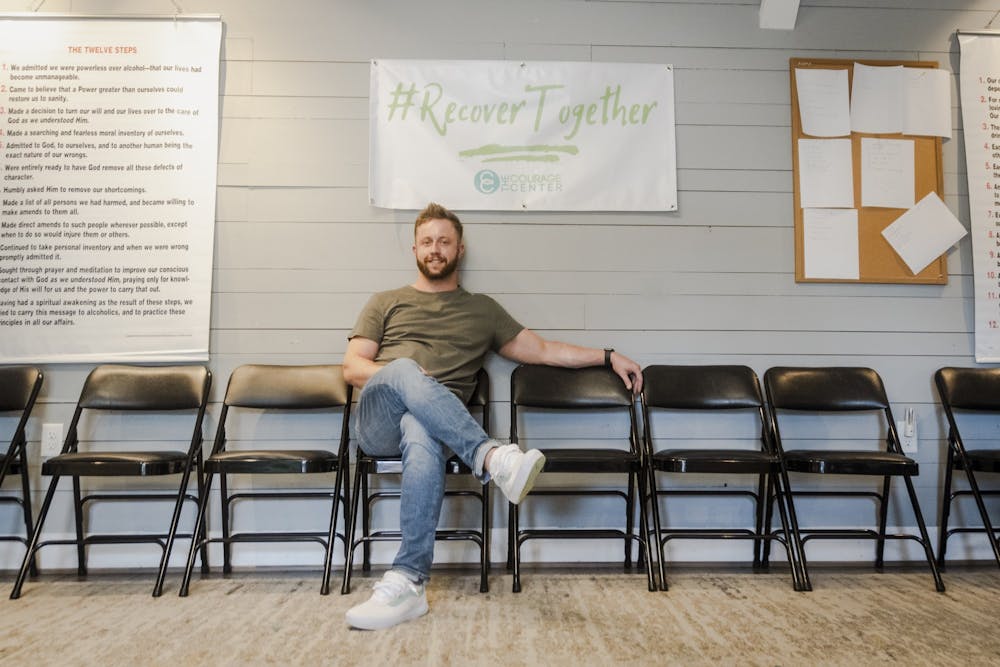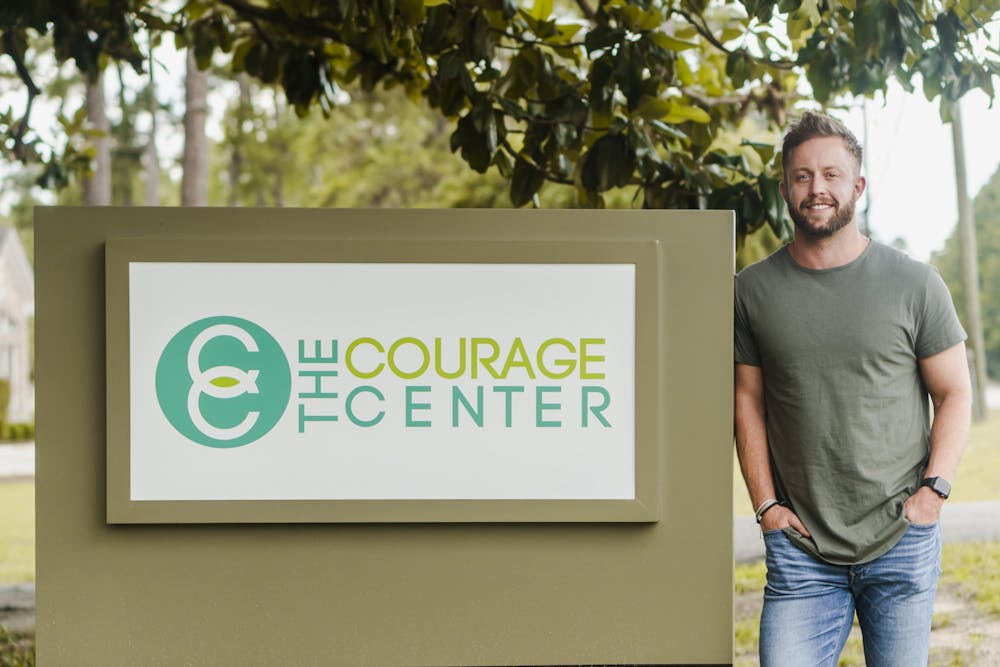Walking into Brock Sansbury’s office, one can see a pile of books with, “Daring Greatly” by Brené Brown on top. He explained that he uses the book to teach about the power of vulnerability to the members of the Courage Center.
The Courage Center (TCC) is a designated Recovery Community Organization, which is an independent, local, nonprofit organization led by representatives of local communities of recovery. The mission of the Courage Center is to provide a “safe, supportive, recovery focused setting for young people and families on their journey to recovery from substance misuse or abuse disorder.” They serve members of the community ages 14 to 26.
Deputy Director Sansbury explains that recovery has to be approached in a different way with adolescents and young adults because the brain is developing. The team at TCC implements a program called MAAPS, or Midlands Adolescent Addiction Peer Support. The MAAPS curriculum is evidence-based and equips young people with the tools and skills they need to carve out a positive life and future for themselves. Furthermore, this program is completely free and TCC offers no-cost transportation assistance if needed.
Sansbury is a person in long-term recovery from addictions that began in his youth. He embraces his powerful story of recovery to relate to and inspire the young people engaged in MAAPS at TCC to live beautiful lives free of substance abuse.

Sansbury grew up in the Midlands, raised by his mother and grandfather. His parents divorced when he was young, and his father was an alcoholic – thus not present in his life. He remembers feeling different from his peers at a very early age. “I remember, early on in life, I thought differently than other people.” He became obsessed with activities like sports and with his identity as a popular kid.
Sansbury smoked his first cigarette around 11 or 12 and started smoking marijuana around 13 or 14. When he smoked his first cigarette, he threw up but remembered thinking he couldn’t wait to do it again. He drank for the first time in sixth grade, got sick and then couldn’t wait to do it again. “Most people with normal thinking capacities don’t think, ‘I can’t wait to get sick again.’ And, of course, I didn’t know what that meant at the time,” Sansbury said.
He partied through middle and high school and surrounded himself with people who were doing the same things. Over time, he began getting kicked off of sports teams and his grades declined. Sansbury said he had no interest in life at all and barely got out of high school.
After graduating, he took a gap year and worked and partied with the same people every night. Over time, “the nights got later, the drugs got harder, the people got sketchier.” He went back to school at Midlands Technical School and UofSC, but flunked out. Sansbury described that he didn’t have drive and didn't know who he was. “I was trying to be this thing that I wasn’t, while I was slowly morphing into the one person I couldn’t stand and didn’t want to be, which was my father,” Sansbury said.
For the next six years, he felt like his life was crumbling around him. Things started to spiral around age 22, and then at 24, the DUI’s and arrests started to come, and he began facing consequences. “I wouldn’t change any of it because I don’t think without the kind of mindset that I had, the consequences that followed, I wouldn’t be here talking to you today.”
In August of 2012, Sansbury tried his first opioid and became heavily addicted. In January of 2013, he got another DUI, and he describes that year as a blur. He was selling drugs, getting robbed and spending time with harmful people. Sansbury had dated a woman for ten years on and off and they got back together the summer of 2013 and she tried to save him. He tried to stay sober, but his addiction slowly crept back into his life. By September of that year, they had parted ways.
He ended up living alone in a house with a maggot infestation and no air conditioning. Sansbury was 35 pounds underweight, couldn’t take care of himself, had no food in the house, no gas in the car and no money in his account. All he had was a freezer full of liquor. Somehow, he managed to always take care of his dog. “I did not eat the dog food, people have asked me that before,” Sansbury said.
Every morning, he’d wake up, get some change from his coin jar, go to the gas station to buy a Coke, then come back and chase it with some liquor until he passed out. He did this every day. One day in mid-October, the woman he had dated previously kicked in his door and said she was going to call the cops or he was going to call his mom, but she wasn’t leaving until he made a choice.
Sansbury decided to call his mom. His mother and grandfather came and stood in his driveway. When Sansbury faced them, his mom said, “you’re either going to live or you’re going to die, but I’m done watching you die.” That moment changed everything for Sansbury. He decided that, although things were going to be difficult, he was going to do what was necessary to get better.
Two weeks later, he was at a treatment center in Florida. He stayed in a sober living house, living with other young people recovering from addiction. After a year, he moved back home and went back to college.
He went back to school two years after recovery, and attended the College of Social Work at UofSC. He was still trying to figure out who he was, where he fit in, and was welcomed with an incredibly inviting environment. He wasn’t sure if he would feel accepted in a college environment because of the culture of partying and drug use, but through the health and human services at UofSC, he found a place for himself in recovery. People knew he was in recovery and embraced him for it. He met with deans and professors: “I never would have thought that that would happen,” Sansbury said.

Sansbury explains that in other parts of the country, collegiate recovery programs, sober housing, sober fraternities and sororities are very common and thriving. At UofSC, he met with three of his peers, formed Gamecock Recovery with the Substance Abuse Prevention and Education (SAPE) office and started providing a safe, supportive space for students in recovery. They had eight students at most come to the meetings, but he emphasizes that even “if it’s one person who could utilize the services, that person should have a seat at the table.” He believes this group is so important at UofSC because of the culture of binge drinking and the pressure students feel to participate in it. “And my thing is always, you shouldn’t have to sacrifice your recovery for your education or vice versa,” Sansbury said.
Sansbury had found his purpose in life again. “My family was back, my friends were back, purpose, for the first time in my life, was very relevant and deep. The passion to help other people was a fire lit inside me and I’ve been doing it ever since.”
After graduating from USC, Sansbury started working at The Courage Center.
TCC was just given a three-year grant from SAMHSA, or Substance Abuse and Mental Health Services Administration. The administration just awarded more than $123 million in funding through six grant programs to 31 organizations in the country to combat the nation’s overdose epidemic. TCC is the only organization in the southern region to receive the grant.
This grant allows them to continue to have the program office on Park Road and the administrative office on Augusta Road and to hire some new people. Furthermore, TCC can now work with other aspects of the community, like the criminal justice system, the education system, the medical services and first responders, “trying to bring everyone to one table and provide better community support,” Sansbury said.
Sansbury hopes they can continue their pilot program with EMS called CORE, Coordinated Opioid Response and Engagement, which is the first in the country. In this program, they give pouches to EMS that contain resource cards, TCC phone numbers and a phone. The medical professional gives this pouch to those in an emergency related to substance abuse. TCC will try to contact them within 72 hours. If they can’t, then it turns into a house call where EMS and some recovery coaches from TCC will try and make physical contact to offer them more support or at least give them Narcan and Fentanyl test strips. Sansbury says the team at TCC hopes to expand this program into Richland and provide these pouches to social workers embedded within the hospital. They also hope to have someone from TCC embedded within the hospital, once things are alleviated with COVID-19.
For those interested in getting involved with TCC as an ally, anyone can become a peer recovery coach through training or volunteer at events. For those looking to become a member, Sansbury says that “everyone is welcome here.”
Throughout the conversation, Sansbury emphasized how grateful he is to be here and how everything he’s been through has given him the strength and passion to help others. “It just happens that I’m this individual in recovery. But when it’s both of your worlds and then you’ve got relationships and family, it’s all about a nice little balance. And it’s an honor to at least attempt to balance it because I should be dead and something kept me here to carry the message forward. So one person saved is good for me.”



